Reasons Your Dog Grunts When You Pet Them
With the background information out of the way, let’s take a closer look at a few of the reasons why dogs grunt when you pet them.
The most likely reason that your dog grunts, groans, or sighs when you pet them is that it is just an involuntary sound they’re making because they are relaxed.
This is not dissimilar to you letting out a long “ahhhhh” when you plop down on the couch or letting out an “oooooooh” when someone scratches your back.
Your dog may be doing other behaviors too that indicate that they are relaxed.
These may include slowly blinking, yawning, slowly lolling their head towards you, prolonged eye contact, or rolling over to expose their belly to entice you to scratch them where they can’t scratch themselves.
Or it may just be a couple of long, contented groans.
Either way, this is probably why your dog is grunting when you pet them, and it’s nothing to be concerned about.
Just let them make their happy little noises.
Whereas the first reason is simply an involuntary expression of their feelings, a dog’s vocalization may be doing more than just that.
It’s possible that your dog is grunting when you pet them in order to communicate something to you.
Like I mentioned, dogs have a pretty limited vocal range and grunts, being a quiet and low impact activity for your dog, as opposed to howling or barking, is a great way for them to communicate to you that they like what you are doing and that they want you to continue.
This is especially true if your dog begins grunting when you start to slow down or if you pull your hand away.
Grunting is an easy way to get your attention and bring your hand back to them to keep the party going.
It is possible, however, that your dog is grunting to communicate to you that they want you to stop.
If your dog is very stiff or if they started grunting as soon as you pet them and stop when you stop, then they may be grunting as a way of actively communicating to you that they do not like what you’re doing, for whatever reason.
You are the best-suited person to read your dog’s behavior, so you are probably already able to tell whether or not your dog is saying “yes” or “no” through their grunts.
Just know that it is possible that they are trying to communicate something to you besides just their relaxed contentedness.
Pay careful attention to any other behaviors they are engaging in at the same time to make sure that you are not making your dog uncomfortable.
Which leads me to the next reason your dog may be grunting when you pet them.
If your dog is stiff when they grunt at you or if you can see their teeth, it is possible that they are responding with aggression to your pets.
While unlikely, your dog may see being pet as an act of dominance on your part. Putting your hand on their back or on their face and roughly rubbing it may make your dog feel insecure or vulnerable.
It is only natural, therefore, for a dog who feels vulnerable and set upon to respond to the situation aggressively in order to protect themselves, even if they are incorrectly reading the room.
If you think that your dog is being aggressive when you pet them, you should take their grunting sounds as a warning that is meant to be and back off.
It is possible that your dog is grunting as a sign of aggression when you pet them, and there’s no reason to mess with that.
There are a ton of factors that can make a dog more likely to grunt than other dogs.
Sometimes, it’s just a simple personality thing. Some dogs like to grunt more than others do, just like some dogs howl while others do not.
Besides personality, their physical characteristics can make a dog more likely to grunt when you pet them too.
Obesity is a common characteristic that leads to both grunting and also snoring in many dogs in America.
The extra layers of fat around your obese dog’s abdomen constrict their lungs and prevent their diaphragms from being able to efficiently expand and contract when they breathe.
The result is sharper breasts and audible, grunting-like sounds when they breathe.
Dogs with brachycephalic, or short, noses also tend to be gruntier than other dogs.
The short noses make it difficult for air to pass through their mouth and nose and into their sinuses and respiratory system.
Dogs like pugs, bulldogs, Boston Terriers, Boxers, and a whole litany of small dogs like Shih Tzus and Pekingese (and any dogs that are mixed with them) are all short-nosed dogs that are more likely to respond with a grunt than other vocalizations.
While there’s not much you can do to change the shape of your dog’s face, you can help reduce some of the negative effects of their squished face by treating them with these sinus support droplets. They help reduce inflammation and regulate mucus production, which helps give your dog an edge when it comes to breathing deeply.
Do you think it’s cute when your dog grunts?
What do you do when they grunt?
Keep in mind that your dog is usually an incredibly clever creature. They are constantly learning from you, even if you are not actively trying to teach them something.
Say, for example, one day you’re petting your dog and he lets out a grunt for the first time.
You find it kind of cute in that ugly/happy little way dogs can be, so you respond positively with treats, “awwws,” and more scratches and rubs.
Your dog, not being any dummy, likes pets and scratches and it’s not too much of a leap for them to realize that they got more of what they wanted after they grunted.
So next time, they’ll be quicker with a grunt because now they know (or think they know) that you like grunts and grunts get them rewards.
This type of classical conditioning can happen in all manner of situations with your dog. It can often lead to frustration and confusion on the part of the owner, who ends up wondering how and why their dog ended up doing such odd behavior seemingly out of nowhere.
But remember that your dog is always watching you, so if your dog grunts when you pet them, it’s entirely possible that you are reinforcing the behavior, and the grunting actually has very little to do with your dog’s desire or need to grunt.
Why Does My Dog Grunt, Groan, Moan, And Growl?
Dogs have worked out incredibly interesting and nuanced ways to communicate with each other and people using what is in fact a fairly limited vocal range.
While it varies between breeds, it’s generally regarded that all dogs use 6 basic forms of vocalizations, while some breeds have up to 10.
Barking and howling are pretty distinct, active vocalizations that you are not likely to conflate with grunting.
Whining, growling, and sighing could easily be mistaken for grunting, so it’s important that you properly identify the behavior that you’re observing before you continue.
Whining is higher pitched and usually doesn’t come with much expulsion of air. It typically indicates that a dog wants something or that they have anxiety or fear.
Growls are lower and more sustained than grunts. They are typically accompanied by stiffness and other signs of discomfort, but not always barred teeth.
Grows are, by design, supposed to be intimidating and attention-getting. They typically mean “stop” or “stay back.”
Interestingly, dogs and humans sigh for more or less the same reasons: contentedness or disappointment. This is similar to grunting behavior, so if your dog is grunting and sighing when you pet them, they are probably doing so for the same reason
It’s been scientifically proven to be difficult, but not impossible, for people to understand very specific emotions that a dog is expressing when they are vocalizing.
Grunting typically indicates that a dog is either relaxed or disappointed.
In the context of petting, unless your dog is bummed out that you are petting them (possible), it’s likely that they are just being relaxed.
If you need more help identifying what type of specific vocalization your dog is doing, check out this video for guidance:
Share this:
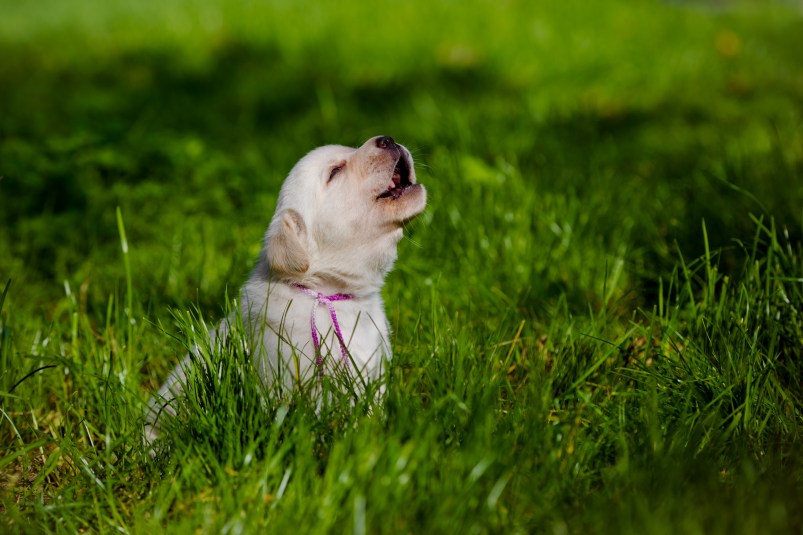
Deciphering what the different dog sounds mean is difficult — even when it feels like we speak the same language as our fur babies. But it’s worth it to learn how to decode dog speak so you always know how your pup is feeling.
Knowing the meanings of different dog sounds and why growling isn’t always a bad thing is key if you want to have the deepest relationship with your pet as possible.
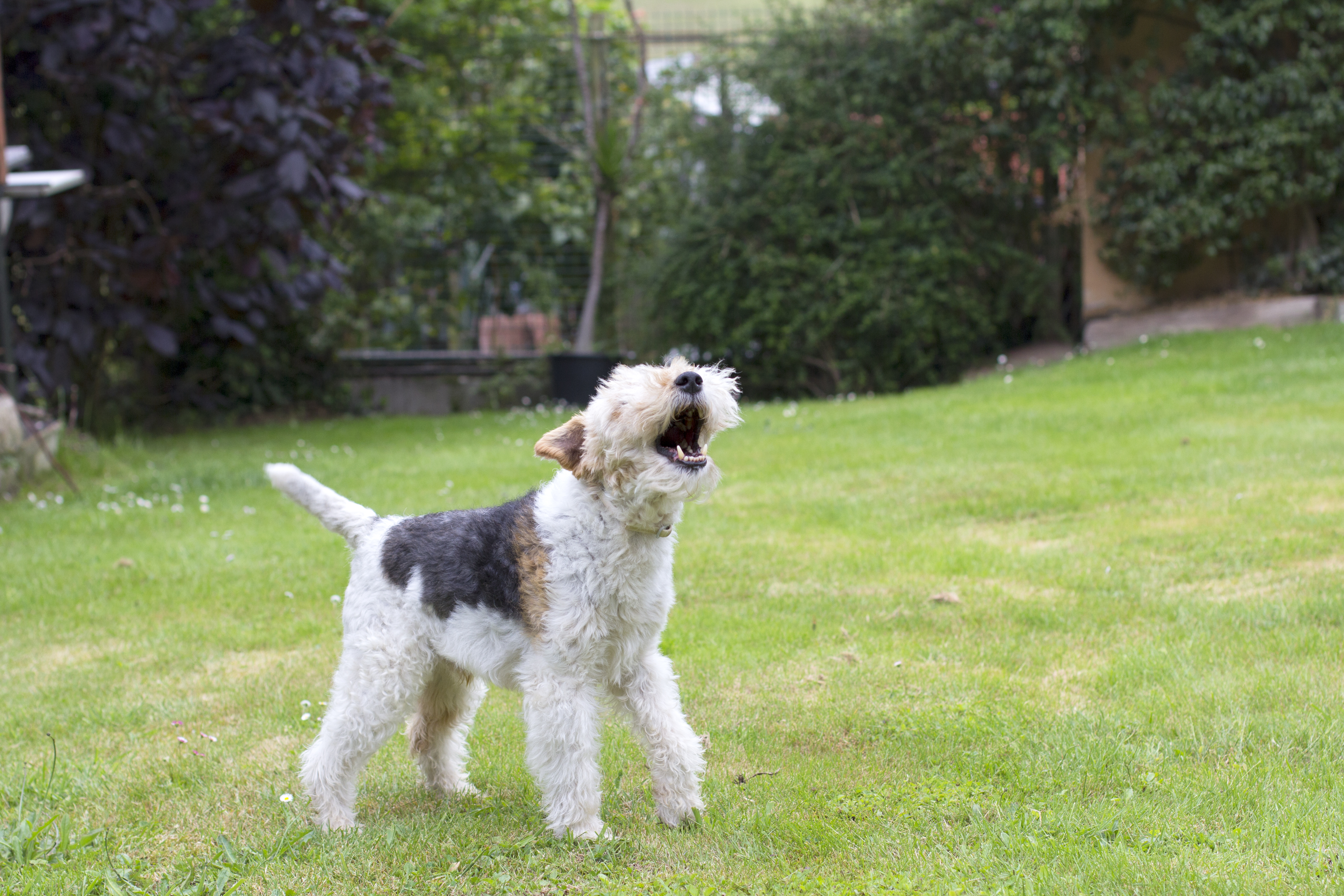

Barking is a common form of communication for dogs, but it may surprise you to learn that there’s more than one type of bark. A dog’s woof will change pitch, duration, and frequency depending on whether he or she is warning you about the very dangerous mailman or is simply saying, “I see you have food and I want some.” Being able to determine variations in those three characteristics will make it clear what your dog is feeling.
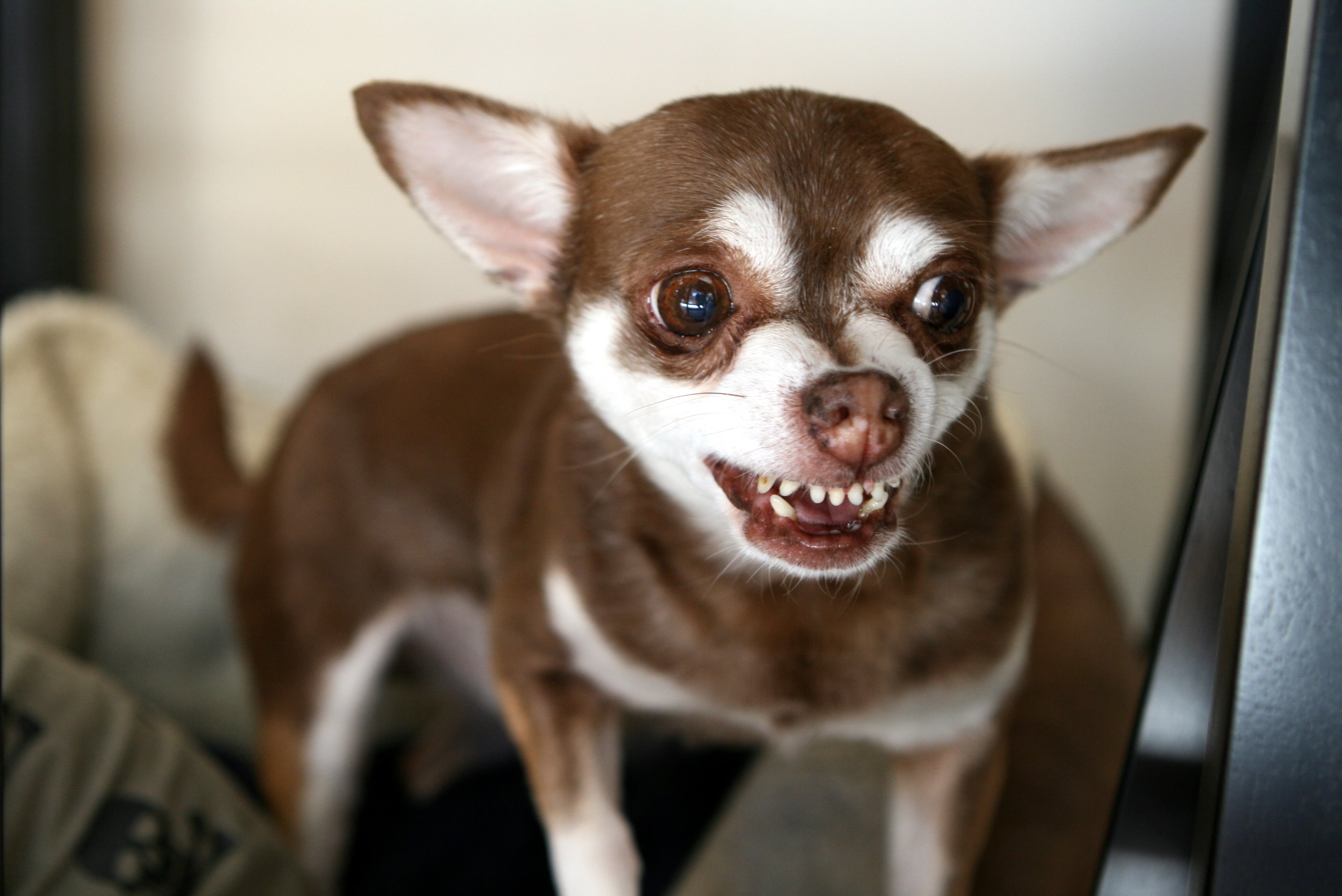

When a dog starts growling, your first inclination might be to move away — and you should. These dog sounds are a verbal cue that your your pooch is uncomfortable, unhappy, or both. In most cases, growling can be attributed to possession aggression (you try taking a toy away), fear (a new person approaching, for example), marking territory (“this is my house and you don’t belong here”), or pain due to injury.
Sometimes dogs may growl when they’re having fun, like during a game of tug-of-war. That said, watch for signs that your dog is going to snap if the playing gets too intense — like if he suddenly stops wagging his tail. Usually, dogs will trot off with their toy if they’re done playing, but sometimes they may suddenly start showing aggressive behaviors, in which case it’s better to back off and take a break.


Hearing a dog whine, whimper, or cry is one of the most heartbreaking sounds — so it’s not surprising that dog owners are desperate to know how to cheer up their pets. Pinpointing the underlying reason for a dog’s whine can be difficult, as all breeds exhibit this behavior for any number of reasons.
One common culprit is that your dog wants something. If it’s a case of a toy that’s fallen under the couch and your pup’s legs are too short to reach, you can expect the whining to stop once you’ve retrieved the missing toy. Other times, dogs may whine because they desire food or attention — and this may go on every time they want it. If this is the case, don’t give in to those pitiful cries. The only way to break your dog of this bad habit is to stop indulging him or her.
Fear or pain can also elicit whining from your dogs, so keep an eye out for stimuli that’s potentially bothering them. Fortunately, the source of your dog’s discomfort may be obvious: an unfamiliar house guest, a boo boo at the paws of your cat who was not in the mood to play, or watching you leave for work every day. Taking steps to address your dog’s specific issue should clear up the case of the whimpers asap.
Another explanation for your dog’s whining is that he’s simply saying sorry. If you came home to an overturned trash can and kitchen scraps all over the floor, you may be greeted with a very guilty look and some sad whining. Of course, it’s hard to stay mad when they turn those puppy dog eyes to full power. Just give them a few good head scratches to show you accept the apology and things will go back to being hunky-dory.
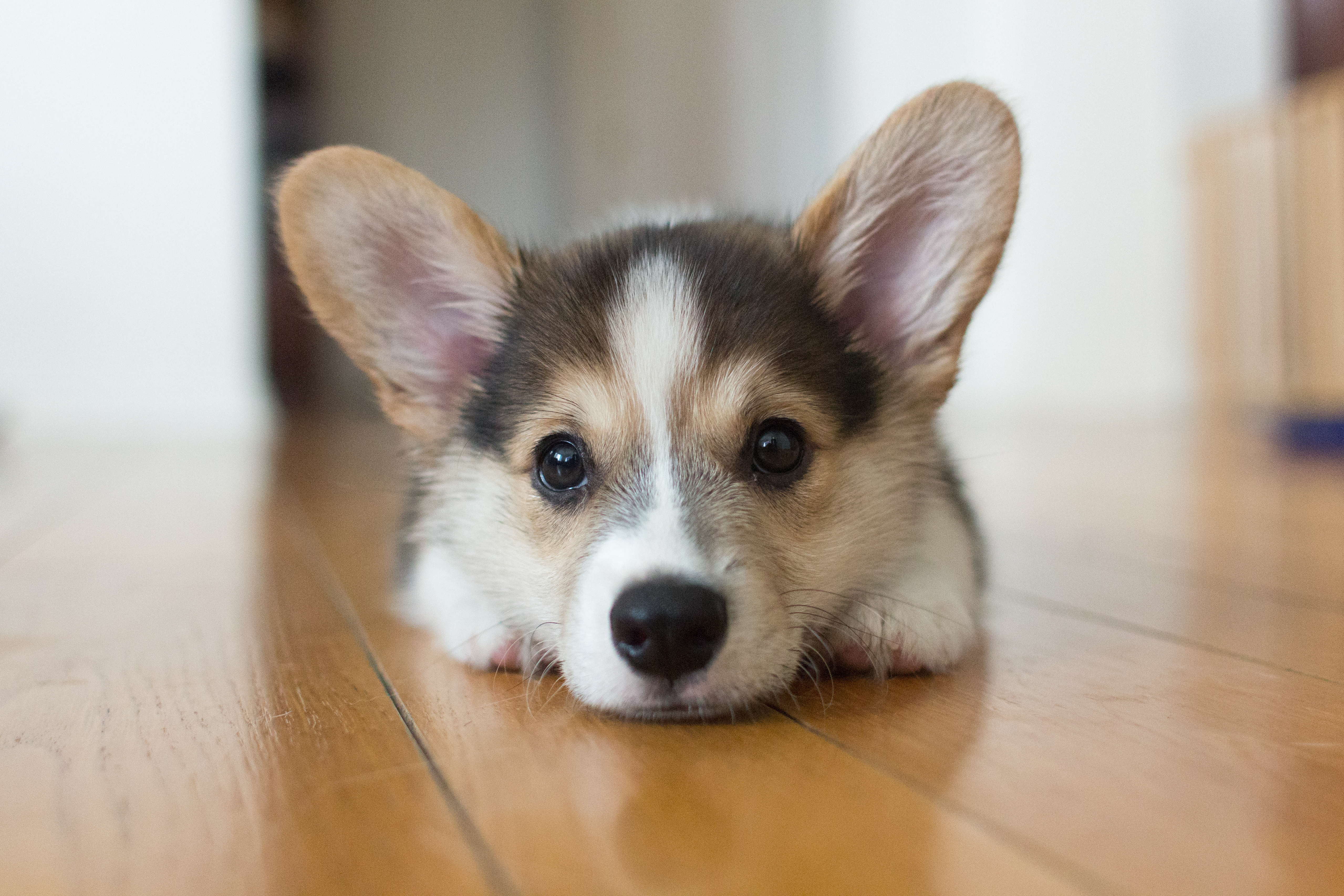

Consider it a compliment if your dog starts grunting the next time he’s sprawled out on your lap. Grunting is an expression of contentment; think of it as the canine equivalent of purring.
Wait, but what about grunting during sleep — should I be worried? If your pup has a tendency to grunt while sleeping, don’t freak out. It’s possible that grunting is an involuntary behavior that happens during sleep and is the result of hard breathing slowed down. Sadly, some dogs may grunt during sleep if they’re having a stressful dream.
It may be time to schedule an appointment with your vet if you notice your dog grunting a lot. This could be a sign of a respiratory issue, so it’s best to have an expert look things over.
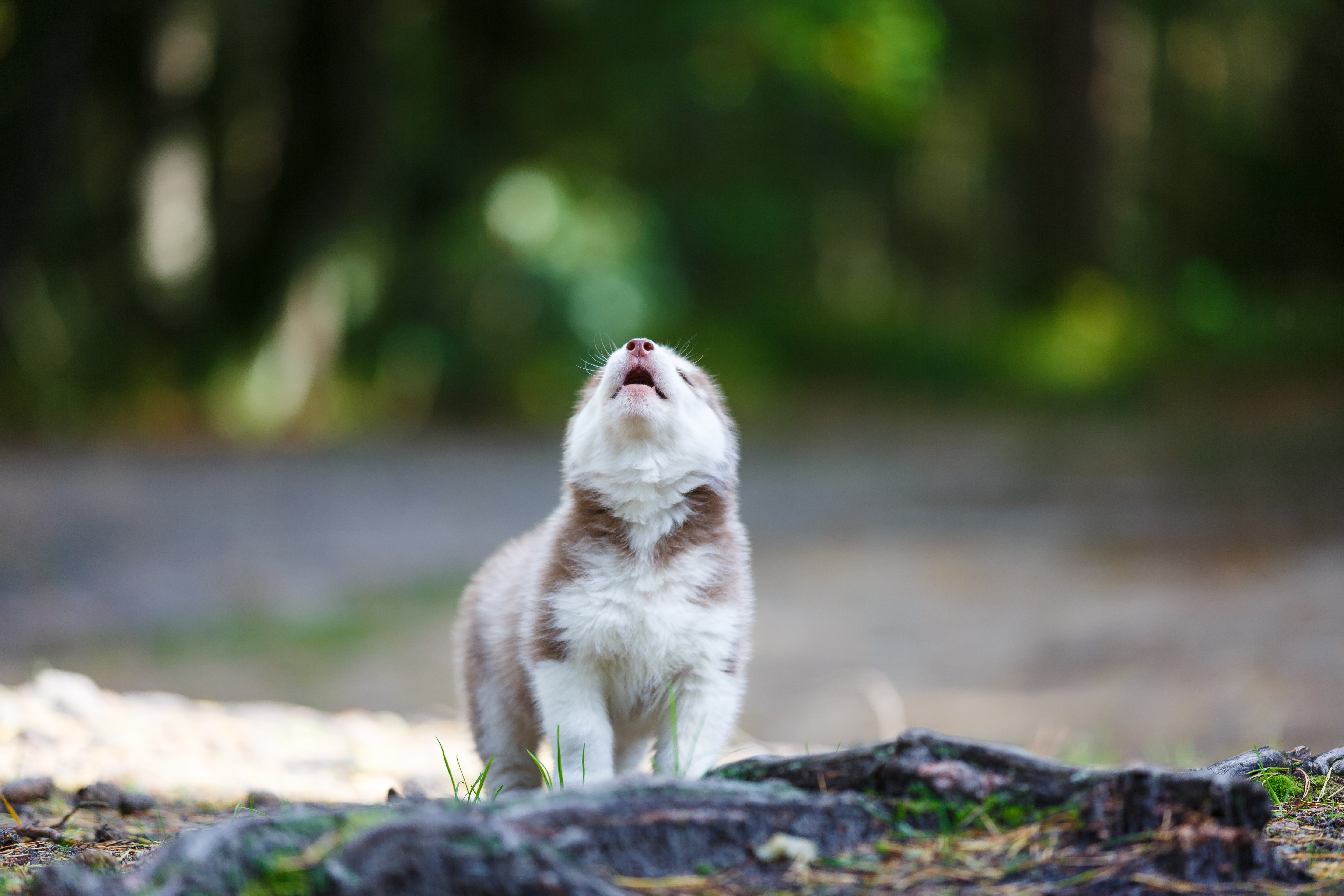

We don’t blame you for wondering, “Why does my dog howl?” after an ambulance drives by or your dog hears another dog yowling in the distance. It’s likely that dogs have the urge to bay as a result of being descended from wolves, which are often depicted as howling at the moon. As long as it’s not a chronic issue that’s seriously affecting your health (like keeping you up at night), howling shouldn’t be cause for concern.
Howling dogs may also be communicating their location to you or their fur brothers and sisters, essentially saying “I’m over here!” Other times, dogs howl to warn someone or something to back off.
Sometimes, howling can be a symptom of more serious health issues. If you notice your dog howling more frequently, it may be time to visit the vet for a checkup. Separation anxiety may also elicit howls from your hound — which may totally break your heart to hear. Fortunately, there are things you can do before leaving that will calm your dog down and reduce his or her anxiety.


Why Is My Dog Groaning When He Lies Down? Puppy Moaning And Groaning Explained!
How often have we felt like our dogs can communicate with us? They listen and understand what we are saying and respond accordingly. While they are not gifted with words, their body language and the limited sounds they can make convey volumes.
Some of the most common sounds that canines make while communicating are barking, whining, growling, howling, sighing, and grunting. Each of these sounds has different variations that our dogs tend to use according to the situation. The sounds may also be accompanied by certain bodily movements.
However, grunting is an unusual sound to hear from our dogs and often raises concern. Here’s an overview of why dogs grunt and groan and what these sounds may mean.
There may have been instances where you may have found your dog making low guttural sounds, like releasing a short breath. It may have sounded like a sigh but more forceful. This is called grunting.
Grunting can often be ruled out as normal vocalization by your dog and an expression of happiness. However, unusual grunting accompanied by other signs of discomfort must be looked into.